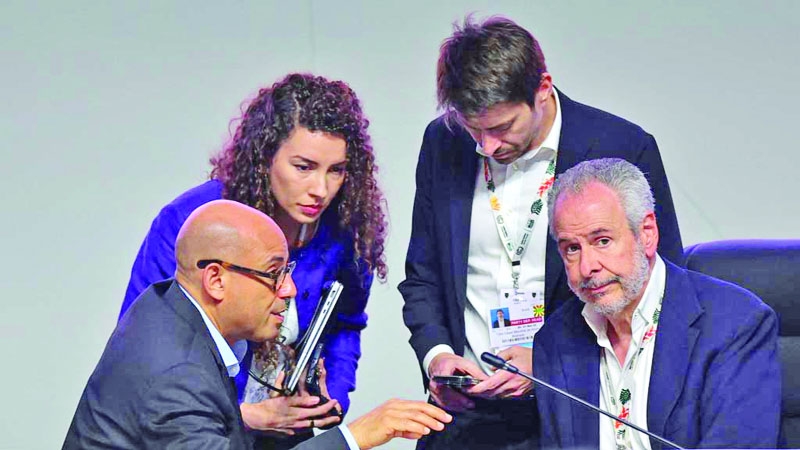Published: 01:01 AM, 24 November 2025
COP30 deal exposes fragile climate unity as US steps back

COP30 President Andre Correa do Lago talks with Executive Secretary of the United Nations Framework Convention on Climate Change (UNFCCC) Simon Stiell before the plenary session during the UN Climate Change Conference (COP30), in Belem, Brazil, Nov 22, 2025. -Reuters
In the final fractious hours of the UN climate summit in Brazil, when a deal to advance the world's fight against global warming was slipping out of reach, COP30 President Andre Correa do Lago reminded them about the cost of failure. This was the first international climate conference since the administration of US President Donald Trump in January abandoned international cooperation on global warming, making it crucial for countries to land an accord that demonstrates unity.
"Those who doubt that cooperation is the best way forward for climate are going to be absolutely delighted to see that we cannot reach an agreement between us," he told the delegates. "So, we must reach an agreement."
In the end, representatives from nearly 200 nations landed a deal. But its contents, and the messy process that led to its adoption, say as much about the world's divisions as its resolve to combat climate change together, according to observers, delegates and climate advocates, reports Reuters.
The final deal approved language that would triple the money for poorer countries to adapt to the worsening impacts of warming, but also shied away from mentioning the fossil fuels that cause it. Observers described it as everything from a win to a very bad joke.
The two-week path to the final deal involved all the human drama associated with extreme fatigue, frustration and obstinance: Indigenous protesters charged the conference gates; Saudi Arabia threatened the deal's collapse if its oil industry was targeted; Panama called the talks a clown show; and the closing ceremony was suspended for an hour as host Brazil tried to sort out objections.
When it was all finally gaveled through on Saturday afternoon, Correa do Lago cried.
THIS IS A WIN; THIS IS A JOKE:
The absence of the United States loomed over the talks. The world's largest historic emitter and top economy declined to send a formal delegation as Trump declared global warming a hoax and efforts to combat it a competitive liability.
EU climate chief Wopke Hoekstra acknowledged the challenge of forging consensus without Washington at the table to help drive it. Under past administrations, the United States has partnered with the EU to drive ambition for a clean energy transition that could help the world slow warming.
"A player of that magnitude... of course it is a major blow if such a partner is not showing up and not taking part," he told reporters at the end of the summit.
This year, the EU had pushed hard for language clarifying the world's transition away from fossil fuels but ended up giving in to demands to keep it out, led by Saudi Arabia, whose Crown Prince Mohammed bin Salman had just been warmly received at the White House.
A representative for Riyadh told delegates in the final hours of negotiations that any language in the accord that targets its oil industry risks collapsing global consensus, according to three sources familiar with the closed-door talks.



